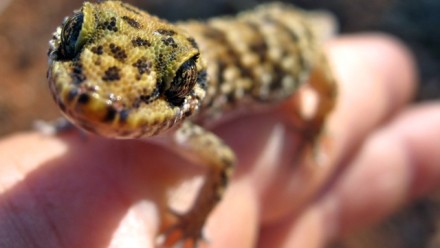Ecological speciation & the role of climatic refugia
Rosa Agudo
The identification and location of climatic refugia is crucial for the conservation of biodiversity in the fate of ongoing global warming
Dr Rosa Agudo is a postdoctoral fellow at ANU where she is working on a project investigating how ecological adaptation to climatically variable environments may explain observed patterns of diversification. She is particularly interested in understanding the role that topographically complex areas and putative climatic refugia have played in the evolution of species.
The project's focus is the monsoonal tropic in northern Australia and the subject of study is a widespread gecko (Heteronotia binoei), which presents numerous geographically restricted and long-isolated lineages in long-term climatic refugia.
Elucidating the genetic basis of adaptation to different environments is a central goal in evolutionary biology. However, until very recently studies have been constrained by available molecular tools, and many fundamental questions remain unanswered.
The advent of next-generation sequencing (NGS) technologies has revolutionised this field of research. It is now possible to generate genetic tools for non-model organism that will allow the integration of genomic and ecological information.
By combining population genomics, gene expression studies and ecological data Rosa hopes to address whether divergence between populations is mainly caused by natural selection or neutral processes, and if exposure to similar environments leads to the evolution of similar adaptations.
The occurrence of convergent/parallel evolution has long been taken as evidence of adaptation. However, its interpretation is still not totally clear. Have convergent phenotypes been produced through similar changes at the genetic level?
This understanding is becoming even more relevant with ongoing global warming and associated environmental changes. By integrating phenotypic and genomic analysis, together with spatial modelling data of putative refugial environments, Rosa hopes to understand how species will respond to current climate change.
New sequencing technologies will allow Rosa to investigate two relevant questions with unprecedented precision:
- how species respond demographically, and/or via novel adaptations, to climatically variable environments; and
- where in the landscape species persisted through historical climate change.
By identifying climate change refugia and the population dynamics associated with them, Rosa's research will help inform conservation policy and management in the fate of ongoing climate change.
How will species respond to climate change













